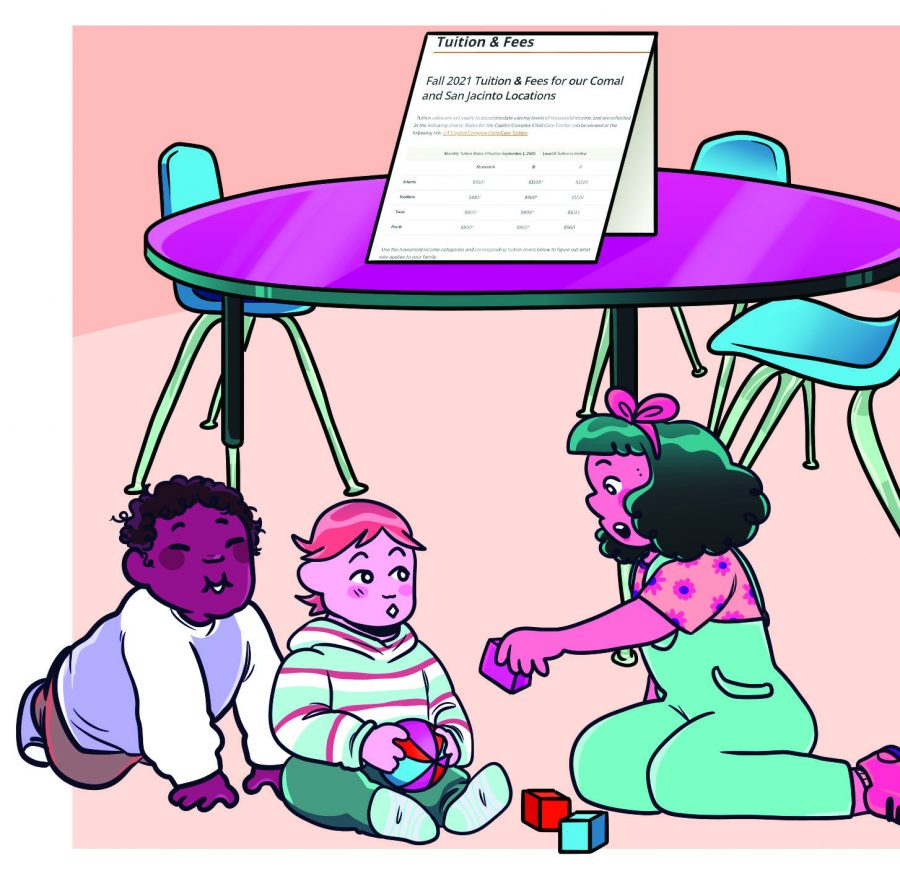UT-Austin student parents face difficulties navigating University policy on childcare
October 25, 2021
Editor’s Note: This article first appeared as part of the October 5th flipbook.
Unable to afford daycare, Maile Marriott said she and her husband, who is a law student, originally worked out a plan to take care of their 18-month-old daughter by occasionally bringing her to the office.
After Marriott received notice that she could not bring her daughter to her workplace about a month ago, she contemplated quitting her research and employment at UT-Austin.
“My first reaction when I got off the phone with (the dean’s office) was this might be it for me,” Marriott said. “If I can’t have her on campus with me since they are giving me a blanket ban on bringing her with me at all, how can I get my degree? I can’t.”
Marriott said a member of the physics department submitted a complaint saying her daughter should not be in the physics building. When Marriott took the complaint to the department head, they took it to the CNS Dean. She said neither individuals offered support and told her she could not bring her daughter to the workplace per employee policy.
The CNS department head redirected The Daily Texan’s request for comment to Hara Cootes, director of the child development center.
Physics graduate student Marriott, along with other student parents, said they are struggling with UT’s restrictive rules regarding bringing children to work and how expensive the University’s childcare is. The University offers a daycare system for student parents with fees over $800 per month depending on household income and the amount of tuition they pay. Additionally, the waitlist for infant daycare is currently one to three years, according to Cootes.
In response to limited childcare resources at UT, over 100 College of Natural Sciences students and faculty have signed a petition since Sept. 27 requesting accommodations for student parents. The petition also urges the University to subsidize daycare fees and make graduate students a priority on the infant daycare waitlist.
Currently, Marriott said she cannot afford UT daycare since her family’s only source of income is her graduate stipend.
“We can’t really afford childcare on just my graduate stipend, which is what we’re living off of right now,” Marriott said. “I assumed that my office would be an okay place to have her occasionally, and we got approval to use the lactation room in the physics building for her naps.”
Marriott initially planned on leaving UT but is now considering staying at the University after seeing the petition.
“It’s been hard with the length of all of this process,” Marriott said. “It has definitely impacted my academics with the amount of time that I have to spend researching things and the amount of sleep that I’ve lost over this because of the stress was really rough, but hopefully it results in some type of change.”
Andrea Gardner, a member of the Graduate Student Assembly, said the child development center should prioritize its waitlist based on level of income and the access they may have to other forms of child care instead of first come, first served.
Physics professor Andreas Karch said current UT policy considers bringing children to work as using university property for personal gain which is prohibited. However, Karch said he feels UT should provide free child care services.
“I don’t think bringing your kid is like using University property for your personal gain,” Karch said “It’s not like the room gets destroyed if you bring your kids into it.”
Gardner said she is writing General Services Administration legislation to call on UT to implement guidelines for student parents to consider when taking a job at the University.
“We should have better policies that prevent this kind of discrimination so people don’t have to run to Title IX to be taken seriously,” Gardner said. “ Nobody wants to bring their kids to work, but they don’t have a choice.”
Gardner said with the amount of attention the issue has at the moment, she hopes to get organizing groups together on campus to further influence the University to implement their requests.
“In order to have more change happening quickly, I think this is an effort that needs to come on multiple fronts,” Gardner said. “I’m really excited to see this petition coming out from physics, pushing forward on another front saying we want change on this issue … and I think if we can get Underpaid at UT get behind it too, we can push it forward.”











